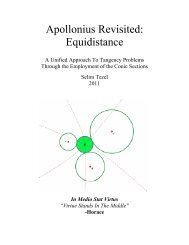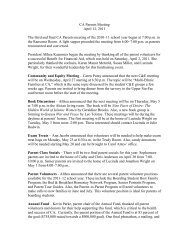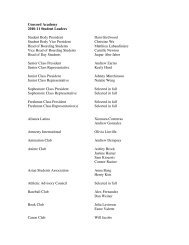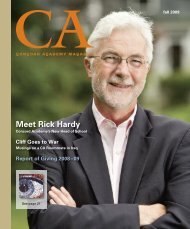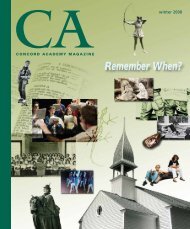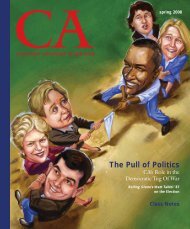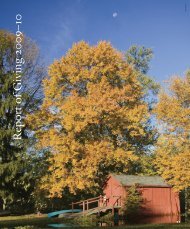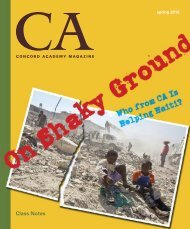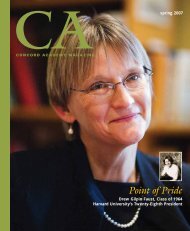winter 2007 - Concord Academy
winter 2007 - Concord Academy
winter 2007 - Concord Academy
- No tags were found...
You also want an ePaper? Increase the reach of your titles
YUMPU automatically turns print PDFs into web optimized ePapers that Google loves.
Vergil is omnipresent in the opera, today morethan ever: a new translation of The Aeneid byRobert Fagles has reignited interest in the Romanpoet whose work has too often been left in theshadow of Homer. The music and dance programs’joint endeavor capitalizes on the newvogue for Vergil: <strong>Concord</strong> <strong>Academy</strong> will see thebaroque opera based on a Roman poem performedwith modern daring. For example, theopening storm and background information willbe presented as a prelude, staged in the squashcourts, one floor below the dance studio. TheDance Company, at Dido previews, already hasrevealed a militaristic dance from the prelude,with harsh vocalizations and severe footwork.This strikingly modern opening, through the helpof costumed dancers, will transition to the initialscene of the classical opera.To Colton, the modern prelude provides anopportunity to put the opera in context: “Purcellbased his libretto on book four of Vergil’s Aeneid,the Dido incident. Our prelude and epilogue willjump off of books three and six, where Vergilgives background to the Dido incident and followsits aftermath.” In a sense, modernizing theprelude was Colton’s statement about Purcell andhow extreme his work was, in his time. “We willuse contemporary music in these sections, whichwill create an interesting frame for Purcell’s 1690score,” he said. “We are hoping it will bring to thefore its radical nature.”Dido may have been destined for <strong>Concord</strong><strong>Academy</strong>: Purcell originally wrote it for a girls’school (which <strong>Concord</strong> <strong>Academy</strong> was for half acentury), and it remains the only classical operawith an English libretto (which makes singingand understanding feasible for opera novices).When Music Program Director Keith Danielarrived at <strong>Concord</strong> <strong>Academy</strong> in 1978, he foundyellowing copies of Dido’s choral music amongthe department’s many papers. He assumed theopera had been produced by students before hisarrival, but learned that CA had never staged afull opera. Nearly thirty years later, the thoughtof staging the piece lingered, and Daniel decidedthe time was right: he had strong singers, apowerful Dance Company, and the necessaryfinancial support, thanks to donations fromseveral <strong>Concord</strong> alumnae/i and family membersspecifically earmarked for this operatic production.Dido and Aeneas will fulfill one of Daniel’sdreams. “Con duct ing opera is the height of theconducting experience,” he explained.Throughout rehearsals, it became clear that studentshad surrendered to the poem and the score:both are lavish. The artists drowned themselvesin the characters and aura of Vergil and Purcell,listening to hours of baroque music, studyingcostumes, reading classic texts. One evening,during an early workshop, dancers tackled theshipwreck scene, set during a violent storm. Aftera rigorous physical improvisation, one dancerbegan to beat his cape, the rest following. The33WWW.CONCORDACADEMY.ORG WINTER <strong>2007</strong>



